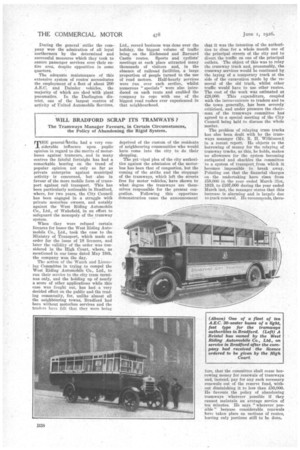I WILL BRADFORD SCRAP ITS TRAMWAYS ? The Tramways Manager Favours, in Certain Circumstances, the Policy of Abandoning the Rigid System.
Page 52

If you've noticed an error in this article please click here to report it so we can fix it.
•
THE general trike had a very considerable influence upon puplic
opinion in regard to the merits of motorbuses against tramcars, and in many centres the fateful fortnight has had a remarkable bearing on the trend of popular opinion not only so far as private enterprise against municipal activity is concerned, but also in favour of the more mobile form of transport against rail transport. This has been particularly noticeable in 'Bradford, where, for two years, the City Council has been engaged in a struggle with private motorbus owners, and notably against the West Riding Automobile Co., Ltd., of Wakefield, in an effort to safeguard the monopoly of the tramway system.
When they were refused certain licences for buses the West Riding Automobile Co., Ltd., took the easeto the Ministry of Transport, which made an order for the issue of 18 licences, and later the validity of the order was considered in the High Court, where, as mentioned in our issue dated May 18th, the company won the day.
The action of the Watch and Licensing Committee in trying to compel the West Riding Automobile Co., Ltd., to run their service to the city tram terminus only, and the holding up of nearly a score of other applications while this case was fought out, has had a very decided effect on the public and the trading community, for, unlike almost all the neighbouring towns, Bradford had been without motorbus services and the traders hro.e felt that they were being
deprived of the custom of the residents of neighbouring communities who would have come into the city to do their shopping.
The pri --eipal plea of the city authorities against the admission of the motorbus has been that of congestion, but the coming of the strike and the stoppage of the tramways, which left the streets free for motor vehicles, have shown to what degree the tramways are themselves responsible for the present congestion. Following this opportune demonstration came the announcement
that it was the intention of the authorities to close for a whole month one of the principal streets of the city and to divert the traffic on one of the principal outlets. The object of this was to relay the tramway track and, presumably, the tramway services would be continued by, the laying of a temporary track at the side of the excavation made by the removal of the old track, whilst other traffic would have to use other routes. The cost of the work was estimated at i28,000. This expenditure, coupled with the inconvenience to traders and to the town generally, has been severely criticised, and under pressure the chairman of the tramways committee has agreed to a special meeting of the City Council being held to discuss the whole matter.
The problem of relaying tram tracks has also been dealt with by the tramways manager (Mr. It. H. Wilkinson), in a recent report. He objects to the borrowing of money for the relaying of tramway tracks, as this, he holds, makes no allowance for the system becoming antiquated and shackles the committee to a system of transport from which it becomes impossible to break away. Pointing out that the financial charges on the undertaking have risen from £58,000 in the year ended March 81st, 1919, to .£107,000 during the year ended March last, the manager states that this increase is alarming and is largely due to track renewal. He recommends, there
fore, that the committee shall cease borrowing money for renewals of tramways and, instead, pay for any such necessary renewals out of the reserve fund, without diminishing it to less than £50,000. He favours the policy of abandoning tramways wherever possible if they cannot maintain an average service of ten minutes. He says "wherever possible" because, eonsiderable renewals have taken place on sections of routes, leaving only portions still to be done.


























































